Brazil government 'not lost control of streets'
The Brazilian government has not lost control of the streets, the deputy minister of communications said on Wednesday as unrest in the country continued to overshadow the Confederations Cup.

Thousands of protestors are expected to march the three kilometres from Rio's City Hall towards the Maracana Stadium on Thursday when world champions Spain play Tahiti in the eight-team tournament, a test event for the 2014 World Cup.
Asked at a FIFA media briefing at the Maracana if the Brazilian government had lost control, Cesar Alvarez, deputy minister of communications, said: "To lose control is something that is impossible. I would not say we have lost control, no.
"We have to keep order at both private and public locations. We do not want to see buses and cars on fire.
"We will listen to what the people are saying but I do not believe there is any connection, or bridge, to the problems and the Confederations Cup. I am not relating these two events," Alvarez added.
"The government of the state and the local government will work together so that protests will not hinder the flow of the fans and the protestors respect the right of the people who want to go and see the match."
The Maracana, one of the world's most famous stadiums, has been rebuilt for the World Cup at a cost of 808 million reais ($400 million) and a crowd of 70,000-plus is expected for the match between Spain and the amateur Oceania champions ranked 138th in the world.
Saint-Clair Milesi, communications director for the local organising committee, said the protestors were planning to walk towards the Maracana.
Get FourFourTwo Newsletter
The best features, fun and footballing quizzes, straight to your inbox every week.
"They are claiming there will be 100,000 or more, but I am not sure how close they will get to the stadium. We shall see."
There were also reports on Wednesday of a large crowd of protestors building up in Fortaleza where Brazil are due to face Mexico in their second match of the tournament.
The demonstrations started as small protests in a few cities against an increase in bus and subway fares but quickly ballooned into a national movement.
The focus of the protestors has also been on the cost of staging the Confederations Cup and the World Cup with demands more money should have been invested in essential services like education, health and public transportation.
